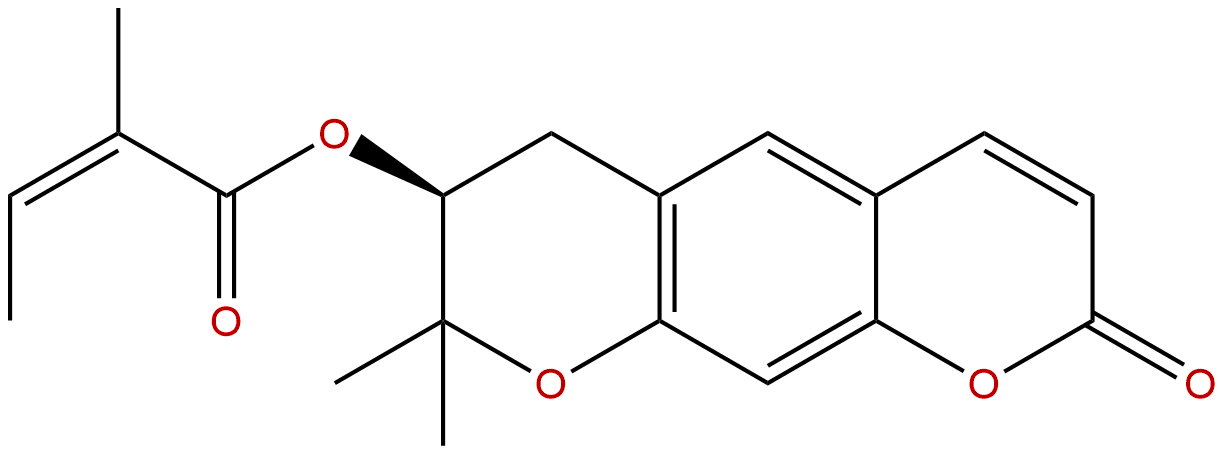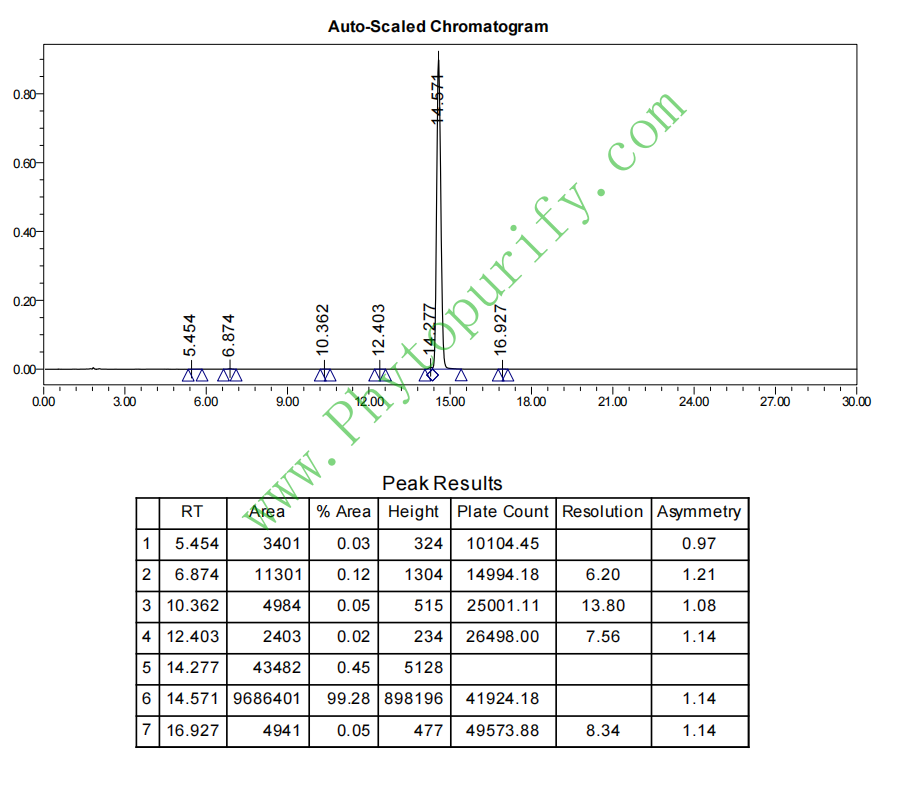
Decursinol angelateCAS No.:130848-06-5
|
||||||||||
 |
|
|
||||||||

| Catalogue No.: | BP1812 |
| Formula: | C19H20O5 |
| Mol Weight: | 328.364 |
Product name: Decursinol angelate
Synonym name: Acutilobin; Decursinol mebutate
Catalogue No.: BP1812
Cas No.: 130848-06-5
Formula: C19H20O5
Mol Weight: 328.364
Botanical Source: Angelica acutiloba (Dong Dang Gui) and Angelica gigas
Physical Description:
Type of Compound:
Purity: 95%~99%
Analysis Method: HPLC-DAD or/and HPLC-ELSD
Identification Method: Mass, NMR
Packing: Brown vial or HDPE plastic bottle
The product could be supplied from milligrams to grams. Inquire for bulk scale.
We provide solution to improve the water-solubility of compounds, thereby facilitating the variety of activity tests and clinic uses.
For Reference Standard and R&D, Not for Human Use Directly.
Description:
Decursinol angelate has anti-tumor, anti-inflammatory, anti-oxidant, and hepatoprotective activities, it inhibits VEGF-induced angiogenesis via suppression of the VEGFR-2-signaling pathway; it also suppresses invasion and inflammatory activation of cancer cells through modulation of PI3K/AKT, ERK and NF-kappaB, its anti-inflammatory activity may contribute to its anti-cancer activity.Decursinol angelate has protective effects against amyloid β-protein-induced oxidative stress in the PC12 cell line. It improves wound healing by upregulating the expression of genes encoding extracellular matrix remodeling proteins, inflammatory cytokines, and growth factors. Decursinol angelate has in vitro and in vivo antifungal activity against Magnaporthe oryzae, the causal agent of rice blast.
References:
Biochem Biophys Res Commun. 2018 May 23;499(4):979-984.
Decursin and decursinol angelate improve wound healing by upregulating transcription of genes encoding extracellular matrix remodeling proteins, inflammatory cytokines, and growth factors in human keratinocytes.
The coumarins decursin and Decursinol angelate, which are found in Angelica gigas Nakai, have a variety of biological functions.
METHODS AND RESULTS:
Here, we show that treatment with these compounds improves wound healing by HaCaT human keratinocytes. Wound healing was increased by treatment with up to a threshold concentration of decursin, Decursinol angelate, a mixture of both, and a nano-emulsion of these compounds, but inhibited by treatment with higher concentrations. Immunoblotting and fluorescence imaging of cells expressing an epidermal growth factor receptor (EGFR) biosensor demonstrated that these compounds did not stimulate wound healing by inducing EGFR phosphorylation. Rather, transcriptional analysis revealed that decursin and Decursinol angelate improved wound healing by upregulating the expression of genes encoding extracellular matrix remodeling proteins, inflammatory cytokines, and growth factors.
Arch Pharm Res. 2003 Sep;26(9):727-30.
Anti-tumor activities of decursinol angelate and decursin from Angelica gigas.
The in vivo anti-tumor activities of Decursinol angelate (1) and decursin (2) isolated from the roots of Angelica gigas were investigated.
METHODS AND RESULTS:
These two compounds, when administered consecutively for 9 days at 50 and 100 mg/kg i.p. in mice, caused a significant increase in the life span and a significant decrease in the tumor weight and volume of mice inoculated with Sarcoma-180 tumor cells.
CONCLUSIONS:
These results suggest that Decursinol angelate (1) and decursin (2) from A. gigas have anti-tumor activities.
Pesticide Biochemistry & Physiology, 2011, 101(2):118-124.
In vitro and in vivo antifungal activities of decursin and decursinol angelate isolated from Angelica gigas against Magnaporthe oryzae, the causal agent of rice blast
Blast is considered the most important fungal disease of rice due to its wide distribution and destructiveness under favorable conditions. Development of new effective and environmentally benign agents against the causal pathogen, Magnaporthe oryzae, is of great interest. In the course of a search for natural antifungal compounds in medicinal plants, we found that the methanol extract of Angelica gigas roots showed a potent control efficacy against rice blast caused by M. oryzae.
METHODS AND RESULTS:
We isolated antifungal coumarins from the extract, and they were identified as decursin and Decursinol angelate. Antifungal activities of these compounds, along with kasugamycin, were tested on M. oryzae in vivo and in vitro. In an in vivo assay, the three compounds effectively suppressed the development of rice blast at concentrations more than 100μg/mL. Coumarins showed relatively weak inhibitory effect on fungal mycelial growth when compared to kasugamycin. However, they strongly inhibited M. oryzae spore germination, which was not observed in kasugamycin treatments. This is the first report demonstrating that Decursinol angelate can provide control against rice blast and that the two coumarins inhibit M. oryzae spore germination. In addition, the wettable powder formulation of the crude extract of A. gigas prohibited the development of blast symptoms on rice plants more effectively than liquid concentrate formulation of kasugamin, a commercial fungicide.
CONCLUSIONS:
Based on our study, we propose that coumarin compounds as well as the A. gigas root crude extract can be used as natural, benign fungicides for controlling rice blast.
HPLC of Decursinol angelate
